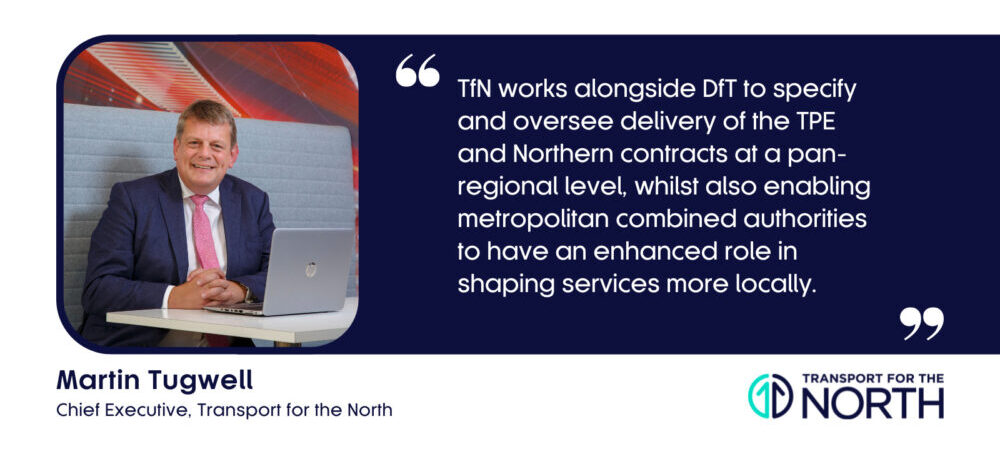Rail Industry Forum 2024: Martin Tugwell sets out a vision for northern rail reform ‘at pace’

The Rail Industry Forum 2024, took place on 1st May in London, with a panel on Plans and progress with the delivery of major rail infrastructure – current project and pipeline of future development. The discussion featured Martin Tugwell (Chief Executive, Transport for the North) and Karen Heppenstall (Head of Integrated Transport, Midlands Connect).
The organisers Waterfront asked Martin to share thoughts on the challenges facing the rail sector and to consider the vital next steps needed for rail reform. Read more below to find out how the North can lead on rail reform ‘at pace’…
What are the next steps for the rail sector with rail reform? What are the opportunities and challenges?
We need to use the devolution that has already taken place within the rail sector as an opportunity to pilot new ways of working that will allow us to make progress with rail reform. In the North, Transport for the North is a statutory body, a partner to the Secretary of State for Transport in setting out the role of the rail sector as part of the wider transport system.
Our recently adopted revised Strategic Transport Plan (underpinned by a comprehensive evidence base) defines the outcomes we seek for the North in terms of the economy, our society and the environment. It sets out how the role of rail needs to grow in order to deliver on those outcomes: it provides the context within which the rail sector can then plan for the future and develop its detailed plans for delivery.
At the same time, through the Rail North Agreement, TfN works alongside DfT to specify and oversee delivery of the TPE and Northern contracts at a pan-regional level, whilst also enabling metropolitan combined authorities to have an enhanced role in shaping services more locally. With TfN representing the political and business voices across the North, there is already the basis for an enhanced level of engagement in the rail sector. Moreover, the powers already devolved by Parliament to the North provide the foundation on which to realise much of the rail reform agenda at pace.
What are the biggest challenges the sector currently faces? How does the industry need to respond to these?
One of the biggest challenges facing the sector is the extent to which some of those most affected by rail reform are also charged with leading the work. Our experience of rail devolution in the North to date has shown the importance of devolving more control away from the centre, and the importance of empowering those charged with delivery.
Whilst oversight and accountability back to the centre will remain important given the extent to which public money is involved, it is absolutely essential to be laser focused on the need to remove inertia, simplify processes and reduce overheads. Our experience with the takeover of the Northern and then TPE contracts by the operator of last resort has shown that it is possible to achieve this.
Another challenge is that of needing to fundamentally change the culture within the rail sector. There is a risk that by virtue of its existence as the only organisation that spans the entire network, that it is the Network Rail culture which predominates moving forward.
If the rail sector is to genuinely embrace a user centred focus (both passenger and freight) then there is a need to establish a new culture: one that genuinely seeks to understand what the operators of services need to achieve in order to deliver on strategic outcomes (like those set out in TfN’s Strategic Transport Plan), with investment in infrastructure then brought forward to enable the operators to achieve their objectives.
And finally, there is a need for the rail sector to work with bodies such as TfN to place the role of rail in a wider context: across the North every £1 of investment in local rail services returns around £4.50 in wider economic, social and environmental benefits. Whilst it is important to manage costs and ensure investment is cost-effective, we must also stop viewing transport investment merely as a cost and start seeing it as an enabler. Over the course of the next 12 months TfN will be using its knowledge, expertise and capability to develop a ‘Northern playbook’, one that shows how to take advantage of the flexibility in the HMT Green Book so that these wider benefits are properly captured.

